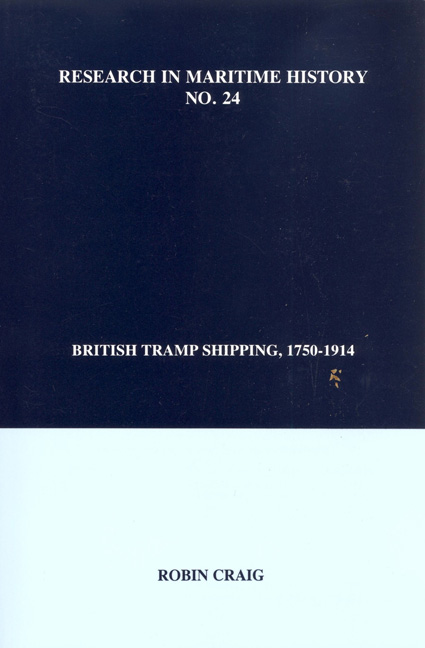Book contents
- Frontmatter
- Contents
- Introduction
- Tramp Shipping and Ownership
- The Trades
- The Seamen
- Tramp-Shipping Regions
- A. Wales
- “Industrial Glamorgan: The Ports and Shipping, c. 1750-1914”
- “Trade and Shipping in South Wales - The Radcliffe Company, 1882-1921”
- “The 1860s at Llanelli - A Dynamic Decade for Trade and Shipping”
- “Carmarthenshire Shipping in the Eighteen Forties”
- “Hetty Ellen of Aberystwyth and Doctor Livingstone”
- B. The Northwest
- C. The West Country
- D. The Northeast
- E. The Southeast
- F. The British Empire: Maritime Canada
- Bibliography
“The 1860s at Llanelli - A Dynamic Decade for Trade and Shipping”
from A. Wales
- Frontmatter
- Contents
- Introduction
- Tramp Shipping and Ownership
- The Trades
- The Seamen
- Tramp-Shipping Regions
- A. Wales
- “Industrial Glamorgan: The Ports and Shipping, c. 1750-1914”
- “Trade and Shipping in South Wales - The Radcliffe Company, 1882-1921”
- “The 1860s at Llanelli - A Dynamic Decade for Trade and Shipping”
- “Carmarthenshire Shipping in the Eighteen Forties”
- “Hetty Ellen of Aberystwyth and Doctor Livingstone”
- B. The Northwest
- C. The West Country
- D. The Northeast
- E. The Southeast
- F. The British Empire: Maritime Canada
- Bibliography
Summary
In this paper it will be suggested that, for shipping, shipbuilding and seaborne commerce, the decade of the 1860s was the most enterprising and dynamic in the history of Llanelly. In some sectors of economic life a peak of activity was achieved that was destined never to be surpassed. It is hoped that a brief examination of these years may shed some light on a period in which sanguine expectations, investment and expansion were to be exceptionally noteworthy. Subsequent decades were to reveal just how many of these bright hopes, particularly marked in the early 1860s, were to be disappointed.
The national background was one of prosperity and rising living standards. This may seem paradoxical when it is recalled that the first half of the decade witnessed the dislocation occasioned by bitter civil war in the United States, at once a major British export market and source of a critically important raw material - cotton. However, the distress in Lancashire brought about by the cotton famine was local, not national, and, so far as shipping was concerned, expansion elsewhere compensated for the interruption of cotton supply. Indeed, the quest for cotton in more distant waters required the redeployment of a large fleet of merchant ships which helped to sustain the general level of freight rates. This was the decade, too, in which the imports of breadstuffs sustained the employment of an unprecedented fleet. Moreover, the second railway construction boom furnished greater opportunities for the merchant marine in that there was increased demand for the raw materials of the iron industry, and timber imports, too, contributed in no small measure to profitable employment for shipping.
The decade had its share of crisis and setback which were to be reflected in the local economy. A paradox of the American Civil War was that its end precipitated a financial crisis, not its course. Speculation in cotton and grain were the immediate precursors of the spectacular collapse of the discount house of Overend, Gurney and Company - a collapse that was foreseen by the percipient. A period of cheap money had, as usual, led to much unwise speculation as well as to much soundly-based enterprise.
- Type
- Chapter
- Information
- British Tramp Shipping, 1750–1914 , pp. 211 - 228Publisher: Liverpool University PressPrint publication year: 2003

